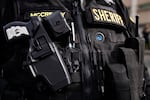Body-worn cameras, dashboard cameras and cameras embedded in the rear seats of patrol vehicles could be deployed at the Vancouver Police Department as soon as spring 2022.
That’s according to City Manager Eric Holmes, who on Monday night presented an outline to make the long-awaited technology a reality at the city police force.

Washington County Sheriffs Deputy Jarrod McCreary is seen wearing the department's new body camera system on March 8, 2021, in Hillsboro, Oregon. Now Vancouver, Washington, police are considering adopting the technology.
Jonathan Levinson / OPB
The news comes as tensions remain pitched between civil rights organizations and local law enforcement.
Vancouver police shot three people – two fatally – in 2020. Separately, the Clark County Sheriff’s Office has shot and killed two Black men since last October. Last week, a hot microphone caught a Clark County judge deriding one of the Black men killed, Kevin Peterson Jr., and his family.
Jasmine Tolbert, president of the NAACP’s Vancouver chapter, said Tuesday that the organization supports cameras, but is hawkish about ensuring the city adopts policies around camera use that foster public trust.
“I’m supportive of (cameras) in general,” Tolbert said. “If you put policies in place so the public can never access the footage, or there’s weird things going on behind the scenes before it’s viewed, things like that, then they just become worthless.”
In his presentation to the Vancouver City Council, Holmes said the city is trying to strike a balance: swiftly adopt cameras, while factoring in upcoming negotiations with police unions, and taking care to develop policies that the public trusts.
“Council has been clear, the community has been clear, that we want to move very quickly,” he told councilors.
Holmes’ camera proposal is beefier than previously discussed. The city has often talked about body-worn cameras, with dashboard cameras as a secondary thought. Monday’s presentation included both and introduced the seat cameras.
It’s not yet clear how much the city will spend. The plan would have the city buy the hardware, pay for ongoing storage and technology costs and hire knowledgeable staff. The city also plans to hire another attorney to handle public records cases that involve footage. Previously, Vancouver has pegged the cost of a camera program around $1.5 million.
Holmes said the city is already writing up the paperwork to find vendors. He said the city is also already developing the policies, while negotiating with police unions.
According to his presentation, the city expects to have the policy adopted by July, pick a vendor in September and run a 60-day “test drive” on the new hardware.
The city expects to have a contract signed by December, then start training staff and officers next spring.
The camera program is partly a byproduct of the work done by a task force charged with reviewing more than 80 recommendations of changes at the Vancouver Police Department.
Those recommendations stemmed from a report completed by the Police Executive Research Forum, which found Vancouver police’s use of force rose by 65% from 2017 to 2019.
In 2019, officers with the Vancouver Police Department shot four people – three fatally – in a four-week span. Two killed were people of color, a third was experiencing homelessness.
The Clark County Sheriff’s Office has not yet put forward any budget proposals on body-worn cameras.